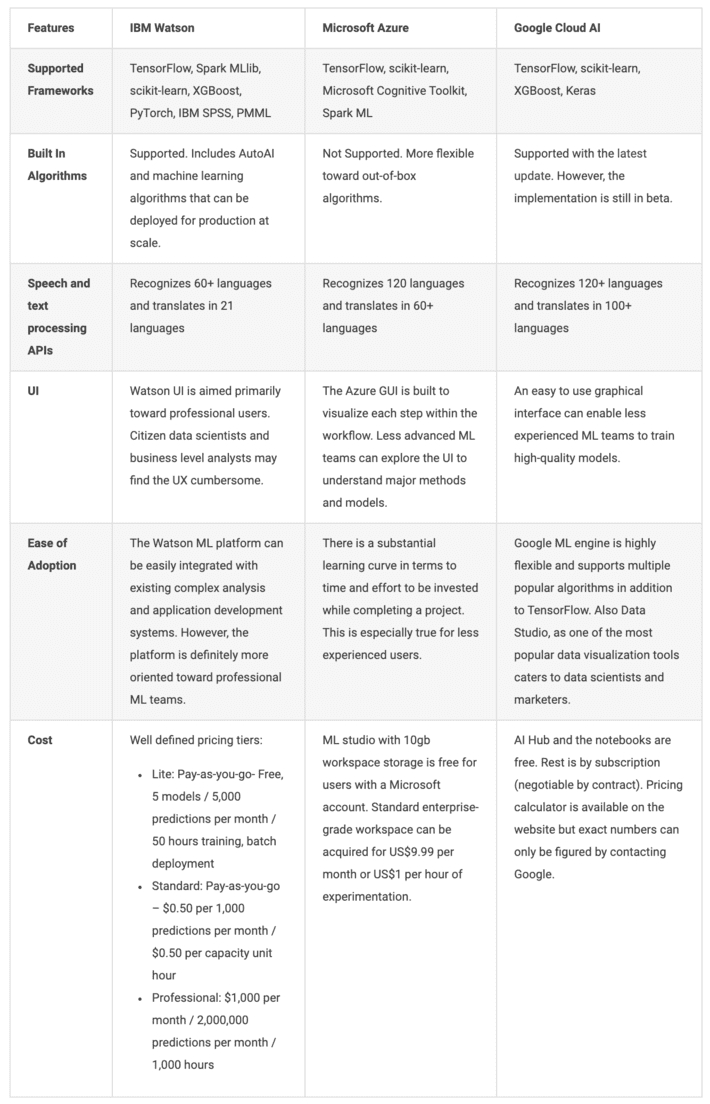The Evolution of the MLaaS Market
The Machine Learning as a service (MLaaS) market is booming. It is expected to grow to $8.48 billion by 2025, at 43% CAGR. Increased cloud adoption and the need to better comprehend customer behavior are expected to be the driving factors propelling the market, going forward. There’s a clear inclination towards the MLaaS model across industries, given the fact that companies today have an option to select from a wide range of solutions that can cater to diverse business needs. Additionally, the proliferation of IoT, automation and AI-driven systems across industries will only amplify the need for MLaaS as a foundation to all these technologies.
Top Three ML Platforms for Data Excellence
Data Science and ML platforms provide companies with the much-needed tools to develop, deploy and monitor ML algorithms. These smart platforms combine data with intelligent, decision-making algorithms that include functionalities for voice recognition, image recognition, natural language processing (NLP) and so on.
There are several ML platforms available in the market. Selecting the right solution, however, can be a daunting task – one that needs thorough research and comparison beyond just the solutions and the core technical capabilities. In order to make the task a little easier, we have profiled the top three ML platforms in one place for review.
IBM Watson
IBM Watson studio or Watson Machine Learning is essentially an amalgamation of IBM cloud services focused on the creation, training, and deployment of neural networks and ML models. By leveraging the Watson Machine Learning platform, companies can develop analytical models and simultaneously train the same with their own data and integrate them into native applications.
Microsoft Azure
Microsoft Azure machine learning solution provides companies with a collaboration platform to develop, test and deploy predictive data solutions. Azure makes the process of creating ML models easy and accessible. This ensures that the developed models can be accessed by a larger audience group within a short time-frame. Additionally, this platform also makes it easier for data scientists and engineers to start mining predictive data. This makes it an ideal option for the ones with little to no experience.
Google Cloud AI
Google cloud AI is a fusion of several Google AI/ML based projects like Tensor Flow, Kuberflow, and Cloud ML Engine. It includes a complete range of machine learning services like data preparation, data tuning, and data training. Data scientists can leverage this platform to deploy and share ML models and collaborate on its improvement.
A Detailed Comparison of the Three ML Platforms

Rounding Up
Selecting the right ML Platform among the myriad of options available out there can be an overwhelming proposition. Each solution can be differentiated in terms of algorithms, skill sets required to operate the platform and tasks performed. So, how you go about picking that one platform that will cater holistically to all your business needs depends on what your company intends to achieve through the machine learning program. The trick is to rightly align data science with your long term business objectives. Once you achieve this, selecting a platform that ticks all the right boxes will become easier.
About the Author
Vivek Jain is a lead data scientist at Sigmoid with expertise in implementing ML solutions across Hyper personalisation, deep neural networks, demand forecasting, Text analytics, to name a few.

